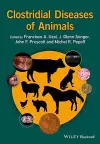
Clostridial Diseases of Animals
4 contributors - Hardback
£126.95
Joseph E. Alouf is Professor of Microbiology at the Pasteur Institute of Lille. He is former Head of the Department of Bacteriology and Mycology at the Pasteur Institute at Paris and Chairman of its Scientific Council. He served as Secretary General of the French Society of Immunology from 1984-1986 and President of the Federation of the European Microbiological Societies from 1989-1992. His 40-year research work relates to the field of bacterial protein toxins and immunology of infectious diseases. He is also the co-editor of several books. Daniel Ladant is Director of Research at French CNRS (National Center for Scientific Research) and head of the “Biochemistry of Macromolecular Interactions unit at Institut Pasteur, Paris, France. He obtained a Ph.D. in Microbiology in 1989 and a « Habilitation à Diriger des Recherches » (HDR), in 1999 from the Université Paris Diderot, Paris, France. His research has been mainly focused on the study of the molecular mechanisms that underlie protein-protein and protein-membrane interactions, using as a model system a bacterial toxin, the adenylate cyclase (CyaA) produced by Bordetella pertussis, the causative agent of whooping cough. CyaA is an essential virulence factor from B. pertussis, and belongs to the large family of RTX (Repeat in ToXins) cytolysins produced by diverse Gram-negative bacteria. By combining molecular genetics, biochemical and biophysical approaches, he has characterized the structure, function and biogenesis of the CyaA toxin, with a particular emphasis on deciphering the molecular basis of its original entry pathway that involves a direct translocation of its catalytic domain across the plasma membrane. Basic knowledge gained on the mechanisms of CyaA entry into eukaryotic target cells and its interaction with cellular effectors has been used to develop various applications in vaccinology and biotechnology. In particular, the natural property of the CyaA toxin to target immune cells has been exploited to create innovative vaccines capable of stimulating potent cell-mediated immune responses against specific antigens. Two CyaA-based recombinant vaccines are currently evaluated in clinical trials. D. Ladant also designed a CyaA-based two-hybrid (BACTH) technology that has been exploited for studying, in bacteria, the assembly of protein complexes, and particularly to analyze membrane associated machineries such as bacterial secretion systems or the bacterial cell division apparatus. His other research interests include the other class II bacterial adenylate cyclase toxins, such as Edema Factor (EF) from Bacillus anthracis and ExoY toxin from Pseudomonas aeruginosa, in particular to explore of the allosteric mechanisms implicated in the activation of these enzymes by eukaryotic factors. He has published more than 90 articles in peer-reviewed journals, 20 review articles or Book chapters and co-authored 11 patents. Michel R. Popoff, D.V.M., Ph.D. (Microbiology) from the University of Paris (1985), Habilitation à Diriger des Recherches (HDR) from the University of Paris (1990), is the Head of the Anaerobic Bacteria and Toxins Unit and the Director of the National Reference Center for Anaerobic Bacteria and Botulism at Pasteur Institute, Paris, France. He is member of the French Veterinary Academy. His laboratory is focused on Clostridium toxins through genetic and biological activity analysis and has investigated the regulation of toxin synthesis in Clostridium botulinum and Clostridium tetani. In the recent years, we have analyzed the molecular mechanism of the actin depolymerizing C. sordellii lethal toxin and clostridial binary toxins, the pore-forming C. perfringens epsilon toxin, and the passage of botulinum neurotoxin through the intestinal barrier. He was co-editor of the 3° edition of the Sourcebook of Bacterial Protein Toxins Academic Press (2006).